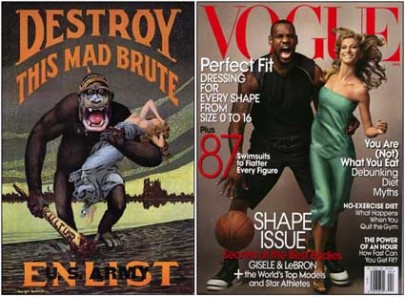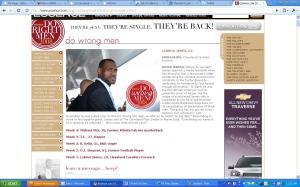I received a distress call from people close to a member of the San Francisco 49ers franchise requesting my services as a PR consultant. The player was on the verge of hurting his public image and his career with his on and off-field antics. He was a hot-head, a loose cannon with no self-edit button. He’d say anything, do anything and played so aggressively it caused people to be concerned about the safety of other players. Yet, the caller assured me that he really was a great guy, a misunderstood person in need of my services.
So I did some research and learned that this player who had an excellent record as a player, had a horrible reputation as a human being and had been tossed from a series of teams throughout his short NFL career because of his inability to work and play well with others. I read his bio and a few articles that discussed his troubled childhood, and started to see the bigger picture that made all of his work in the community make sense. He didn’t just give away toys and turkeys, he gave himself as a mentor to young boys on the block in need of guidance and hope.
As a consultant, you want to feel your clients and empathize with them, and I liked this guy. In fact, it’s safe to say I felt his heart. However, there was one problem.
The player. He just wanted to play a nice guy on TV but didn’t want to give up the people and things that inspired him to be a bad guy on and off of the field. I explained that while there are magical qualities to public relations it wouldn’t be able to make his issues go away; he’d have to address them in an effort to make the public believe in him. He didn’t want to and hired someone else, his problems persisted and he was released from his contract.
 About a year later, Dallas Cowboy Terrell Owens found himself at the helm of a serious PR debacle following what has been described as an accidental overdose by some and a suicide attempt by others. Climbing out of that mess has been incredible for him. It still follows him though it is coupled with his infamous tirades on and off the field. The blessing in his case is that he still has a job and he’s still a hot property.
About a year later, Dallas Cowboy Terrell Owens found himself at the helm of a serious PR debacle following what has been described as an accidental overdose by some and a suicide attempt by others. Climbing out of that mess has been incredible for him. It still follows him though it is coupled with his infamous tirades on and off the field. The blessing in his case is that he still has a job and he’s still a hot property.
One morning, I listened as comedian/radio talkshow host Steve Harvey spoke about the various trials of Terrell Owens. Harvey said he felt sorry for T.O. and other athletes and entertainers who have newly acquired wealth and notoriety. He said that he wished there was a place they could go to learn how to juggle the demands and troubles that come with the territory of being young, rich and famous, and black. And after hearing Harvey’s words, it all came together for me.
First of all, there is no one place for athletes and entertainers to go for sound advice on how to present themselves publicly in a way that makes them re-think how they live privately. Many years ago, I heard David Geffen say that whoever you are before the money is who you are after it. Truer words were never spoken. Still, I’d argue that David Geffen is not a commodity as these young men are, so to focus on internal struggles while trying to keep it together AND perform at an optimal level for the people who exploit you and count on you to entertain them is hard work.
Incredibly hard work.
 This past week, Felicia Young, Vince Young’s mother told The Tennessean that her son was “hurting inside and out,” after the Titan quarterback alledgedly scared the willies out of coach Jeff Fisher enough for the coach to call 9-1-1. Young had a bad game on Sunday, throwing two interceptions, spraining his knee and being booed by the fans. Young disappeared for hours leaving a maelstom of media speculation concerning his whereabouts and mental state. News reports mentioned an unloaded pistol in his car’s glove compartment, and the fact that he’d left his cell phone at Fisher’s house. Of course, a hot mess ensued and now Young is being discussed in terms of his mental instability, his mediocre playing and his need to suck it up and get it together.
This past week, Felicia Young, Vince Young’s mother told The Tennessean that her son was “hurting inside and out,” after the Titan quarterback alledgedly scared the willies out of coach Jeff Fisher enough for the coach to call 9-1-1. Young had a bad game on Sunday, throwing two interceptions, spraining his knee and being booed by the fans. Young disappeared for hours leaving a maelstom of media speculation concerning his whereabouts and mental state. News reports mentioned an unloaded pistol in his car’s glove compartment, and the fact that he’d left his cell phone at Fisher’s house. Of course, a hot mess ensued and now Young is being discussed in terms of his mental instability, his mediocre playing and his need to suck it up and get it together.
In an Associated Press editorial, columnist Tim Dahlberg states, “It’s true that all we usually see is the upside of being a famous professional athlete. We see the good times, the big money, the fancy Escalades, and the women who always seem to be hanging by the clubhouse gates.
“But when things go sour the stark reality of living up to everyone’s expectations can be hard to deal with. It’s not just the boos, but the feeling that they’ve failed in something they never once imagined they would ever fail in.”
Dahlberg gets it, or at least part of it. There’s more.
We all usually see the ‘upside’ of being a famous professional athlete, but we never see the private side of most of these athletes who have to negotiate their worth and value in their sport while negotiating it with family, friends who want them to “keep it real and ‘hood,” and with the people who pay the bills. Internal struggles aren’t even a priority to these guys due to the pressures they face on a day to day basis. I challenge some of the naysayers to deal with a day of a thousand hands in your face wanting something for nothing, telephones that ring off of the hook with offers from people who want to exploit your brand, temptations from so-called friends and family to do things that could jeopardize your career (Mike Vick), while trying to keep your head on straight enough to keep on doing whatever it is you are expected to do on the field.
 Face it, everybody ain’t Tiki Barber, a player I love and admire. If Tiki has or had one issue, we never knew it and that’s because he had a support system that enabled it to be that way. Vince Young, the player I mentioned first, Terrell Owens and countless others do not have that mechanism in place and it’s obvious.
Face it, everybody ain’t Tiki Barber, a player I love and admire. If Tiki has or had one issue, we never knew it and that’s because he had a support system that enabled it to be that way. Vince Young, the player I mentioned first, Terrell Owens and countless others do not have that mechanism in place and it’s obvious.
As a PR consultant and publicist, I see the need for sports psychologists and experts on the politics of sports to start an education campaign that focuses on the issues many of these young athletes face. There are a number of black sports psychologists who can lend needed information on what goes on in the heads of these guys and who can help the public understand that there’s more to it than Vince and Terrell having ‘bad days.’ The need for information is not to justify but rather give insight. (I’m a proponent of psychological assessment of and therapies for black athletes at an early age, but that’s another blog.)
As a PR consultant and publicist, I am dumbfounded and almost speechless at the handling of these situations before they hit the press. The NFL and its teams have entirely too much power and juice to allow stories about their Vince Youngs to be blown out of proportion. In my humble opinion, Vince Young’s disappearance should have been handled more delicately and quietly.
And as a PR consultant, I urge my fellow practitioners with sports clients to start becoming more transparent in their pitching of stories to the press. Fluff stories about community service are cool, but at the end of the day, we need to know about the person. We need to know and especially unforgiving fans and media need to know about the people who in spite of their pain and heartache go out on the field to help our pain go away. Honestly, it’s time to be more sophisticated in leveraging an athlete’s celebrity to gain public support in good times and bad.
In the meantime, I’ll be watching to see how Young rebounds from this mess, and praying that he is surrounded by at least one person with some sense to help him put this into its proper perspective. Someone needs to tell Young, “Yeah, millions of dollars in a deal is great, but you’re worth so much more. For once, take care of you.”
Filed under: African Americans, Crisis Management, Mass-Mediated Images, Public Relations, Sports PR, The Black Pro Athlete, Uncategorized, Associated Press, black, Black paPR Report, black pro football players, Crisis Management, Dallas Cowboys, famous and athlete, Felicia Young, image control, Mike Vick, NFL, perils of being young, PR education campaigns, Robin Caldwell, San Francisco 49ers, sports PR debacles, sports psychology, suicide attempt, Tennesse Titans, Terrell Owens, The J Standard Media Group, Tiki Barber, Tim Dahlberg, Vince Young





